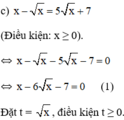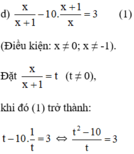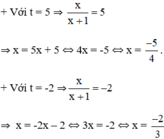Tìm x
a) (x2+4)2 - 4x(x2+4) = 0
b) x5 - 18x3 + 81x = 0
Hãy nhập câu hỏi của bạn vào đây, nếu là tài khoản VIP, bạn sẽ được ưu tiên trả lời.


\(a,\Rightarrow\left(2x-5\right)^2+2\left(2x-5\right)\left(x+2\right)+\left(x+2\right)^2=0\\ \Rightarrow\left(2x-5+x+2\right)^2=0\\ \Rightarrow3x-3=0\\ \Rightarrow x=1\\ b,\Rightarrow9-\left(x^2-5x\right)^2=9\\ \Rightarrow x^2-5x=0\\ \Rightarrow x\left(x-5\right)=0\Rightarrow\left[{}\begin{matrix}x=0\\x=5\end{matrix}\right.\)

\(a.x^2-4x+4=0\)
\(\left(x-2\right)^2=0\)
=>x=2
b) \(2x^2-x=0\)
\(x\left(2x-1\right)=0\)
=> \(\left[{}\begin{matrix}x=0\\x=\dfrac{1}{2}\end{matrix}\right.\)
c) \(x^2-5x+6=0\)
\(x^2-2x-3x+6=0\)
\(\left(x-2\right)\left(x-3\right)=0\)
=> \(\left[{}\begin{matrix}x=2\\x=3\end{matrix}\right.\)
d) \(x^2+y^2=0\)
Vì \(x^2,y^2\ge0\forall x,y\)
=>x=y=0
e) \(x^2+6x+10=0\)
\(\left(x+3\right)^2+1=0\)
Vì \(\left(x+3\right)^2\ge0\forall x\)
=> VT>0 \(\forall x\)
=> phương trình vô nghiệm

a) x³y + x - y - 1
= (x³y - y) + (x - 1)
= y(x³ - 1) + (x - 1)
= y(x - 1)(x² + x + 1) + (x - 1)
= (x - 1)[y(x² + x + 1) + 1]
= (x - 1)(x²y + xy + y + 1)
b) x²(x - 2) + 4(2 - x)
= x²(x - 2) - 4(x - 2)
= (x - 2)(x² - 4)
= (x - 2)(x - 2)(x + 2)
= (x - 2)²(x + 2)
c) x³ - x² - 20x
= x(x² - x - 20)
= x(x² + 4x - 5x - 20)
= x[(x² + 4x) - (5x + 20)]
= x[x(x + 4) - 5(x + 4)]
= x(x + 4)(x - 5)
d) (x² + 1)² - (x + 1)²
= (x² + 1 - x - 1)(x² + 1 + x + 1)
= (x² - x)(x² + x + 2)
= x(x - 1)(x² + x + 2)
e) 6x² - 7x + 2
= 6x² - 3x - 4x + 2
= (6x² - 3x) - (4x - 2)
= 3x(2x - 1) - 2(2x - 1)
= (2x - 1)(3x - 2)
f) x⁴ + 8x² + 12
= x⁴ + 2x² + 6x² + 12
= (x⁴ + 2x²) + (6x² + 12)
= x²(x² + 2) + 6(x² + 2)
= (x² + 2)(x² + 6)
g) (x³ + x + 1)(x³ + x) - 2
Đặt u = x³ + x
x³ + x + 1 = u + 1
(u + 1).u - 2
= u² + u - 2
= u² - u + 2u - 2
= (u² - u) + (2u - 2)
= u(u - 1) + 2(u - 1)
= (u - 1)(u + 2)
= (x³ + x - 1)(x³ + x + 2)
= (x³ + x - 1)(x³ + x² - x² - x + 2x + 2)
= (x³ + x - 1)[(x³ + x²) - (x² + x) + (2x + 2)]
= (x³ + x - 1)[x²(x + 1) - x(x + 1) + 2(x + 1)]
= (x³ + x - 1)(x - 1)(x² - x + 2)
h) (x + 1)(x + 2)(x + 3)(x + 4) - 1
= [(x + 1)(x + 4)][(x + 2)(x + 3)] - 1
= (x² + 5x + 4)(x² + 5x + 6) - 1 (1)
Đặt u = x² + 5x + 4
u + 2 = x² + 5x + 6
(1) u.(u + 2) - 1
= u² + 2u - 1
= u² + 2u + 1 - 2
= (u² + 2u + 1) - 2
= (u + 1)² - 2
= (u + 1 + √2)(u + 1 - √2)
= (x² + 5x + 4 + 1 + √2)(x² + 5x + 4 + 1 - √2)
= (x² + 5x + 5 + √2)(x² + 5x + 5 - √2)

a) Ta có: \(36x^3-4x=0\)
\(\Leftrightarrow4x\left(9x^2-1\right)=0\)
\(\Leftrightarrow x\left(3x-1\right)\left(3x+1\right)=0\)
\(\Leftrightarrow\left[{}\begin{matrix}x=0\\x=\dfrac{1}{3}\\x=\dfrac{-1}{3}\end{matrix}\right.\)
b) Ta có: \(3x\left(x-2\right)+x-2=0\)
\(\Leftrightarrow\left(x-2\right)\left(3x+1\right)=0\)
\(\Leftrightarrow\left[{}\begin{matrix}x=2\\x=\dfrac{-1}{3}\end{matrix}\right.\)

\(a,\Leftrightarrow9x^2=-36\Leftrightarrow x\in\varnothing\\ b,\Leftrightarrow3\left(x+4\right)-x\left(x+4\right)=0\\ \Leftrightarrow\left(3-x\right)\left(x+4\right)=0\\ \Leftrightarrow\left[{}\begin{matrix}x=3\\x=-4\end{matrix}\right.\\ c,\Leftrightarrow2x^2-x-2x^2+3x+2=0\\ \Leftrightarrow2x=-2\Leftrightarrow x=-1\\ d,\Leftrightarrow\left(2x-3-2x\right)\left(2x-3+2x\right)=0\\ \Leftrightarrow-3\left(4x-3\right)=0\\ \Leftrightarrow x=\dfrac{3}{4}\\ e,\Leftrightarrow\dfrac{1}{3}x\left(x-9\right)=0\Leftrightarrow\left[{}\begin{matrix}x=0\\x=9\end{matrix}\right.\\ f,\Leftrightarrow x^2\left(x-1\right)-\left(x-1\right)=0\\ \Leftrightarrow\left(x^2-1\right)\left(x-1\right)=0\\ \Leftrightarrow\left(x-1\right)^2\left(x+1\right)=0\\ \Leftrightarrow\left[{}\begin{matrix}x=1\\x=-1\end{matrix}\right.\)

a)
3 · x 2 + x 2 - 2 x 2 + x - 1 = 0 ( 1 )
Đặt t = x 2 + x ,
Khi đó (1) trở thành : 3 t 2 – 2 t – 1 = 0 ( 2 )
Giải (2) : Có a = 3 ; b = -2 ; c = -1
⇒ a + b + c = 0
⇒ (2) có hai nghiệm t 1 = 1 ; t 2 = c / a = - 1 / 3 .
+ Với t = 1 ⇒ x 2 + x = 1 ⇔ x 2 + x – 1 = 0 ( * )
Có a = 1; b = 1; c = -1 ⇒ Δ = 1 2 – 4 . 1 . ( - 1 ) = 5 > 0
(*) có hai nghiệm


Có a = 3; b = 3; c = 1 ⇒ Δ = 3 2 – 4 . 3 . 1 = - 3 < 0
⇒ (**) vô nghiệm.
Vậy phương trình (1) có tập nghiệm 
b)
x 2 − 4 x + 2 2 + x 2 − 4 x − 4 = 0 ⇔ x 2 − 4 x + 2 2 + x 2 − 4 x + 2 − 6 = 0 ( 1 )
Đặt x 2 – 4 x + 2 = t ,
Khi đó (1) trở thành: t 2 + t – 6 = 0 ( 2 )
Giải (2): Có a = 1; b = 1; c = -6
⇒ Δ = 1 2 – 4 . 1 . ( - 6 ) = 25 > 0
⇒ (2) có hai nghiệm

+ Với t = 2 ⇒ x 2 – 4 x + 2 = 2
⇔ x 2 – 4 x = 0
⇔ x(x – 4) = 0
⇔ x = 0 hoặc x = 4.
+ Với t = -3 ⇒ x 2 – 4 x + 2 = - 3
⇔ x2 – 4x + 5 = 0 (*)
Có a = 1; b = -4; c = 5 ⇒ Δ ’ = ( - 2 ) 2 – 1 . 5 = - 1 < 0
⇒ (*) vô nghiệm.
Vậy phương trình ban đầu có tập nghiệm S = {0; 4}.

Khi đó (1) trở thành: t 2 – 6 t – 7 = 0 ( 2 )
Giải (2): Có a = 1; b = -6; c = -7
⇒ a – b + c = 0
⇒ (2) có nghiệm t 1 = - 1 ; t 2 = - c / a = 7 .
Đối chiếu điều kiện chỉ có nghiệm t = 7 thỏa mãn.
+ Với t = 7 ⇒ √x = 7 ⇔ x = 49 (thỏa mãn).
Vậy phương trình đã cho có nghiệm x = 49.

⇔ t 2 – 10 = 3 t ⇔ t 2 – 3 t – 10 = 0 ( 2 )
Giải (2): Có a = 1; b = -3; c = -10
⇒ Δ = ( - 3 ) 2 - 4 . 1 . ( - 10 ) = 49 > 0
⇒ (2) có hai nghiệm:


Cả hai nghiệm đều thỏa mãn điều kiện xác định.
Vậy phương trình đã cho có tập nghiệm 

d: Ta có: \(\left(x+1\right)\left(x+2\right)\left(x+3\right)\left(x+4\right)=24\)
\(\Leftrightarrow\left(x^2+5x+4\right)\left(x^2+5x+6\right)-24=0\)
\(\Leftrightarrow x\left(x+5\right)=0\)
\(\Leftrightarrow\left[{}\begin{matrix}x=0\\x=-5\end{matrix}\right.\)
a) \(\left(x^2+4\right)^2-4x\left(x^2+4\right)=0\)
\(=\left(x^2+4\right)\left(x^2+4-4x\right)=0\)
\(=\left(x^2+4\right)\left(x+2\right)^2=0\)
Mà \(x^2\ge0\Rightarrow x^2+4>0\)
\(\Rightarrow x+2=0\)
\(\Rightarrow x=-2\)
b) \(x^5-18x^3+81x=0\)
\(=\left(x^5-9x^3\right)-\left(9x^3-81x\right)=0\)
\(=x^3\left(x^2-9\right)-9x\left(x^2-9\right)=0\)
\(=\left(x^3-9x\right)\left(x^2-9\right)=0\)
\(=x\left(x^2-9\right)\left(x^2-9\right)=0\)
\(=x\left(x^2-9\right)=0\)
\(\Rightarrow\orbr{\begin{cases}x=0\\x^2-9=0\end{cases}}\)
\(\Rightarrow\orbr{\begin{cases}x=0\\x\in\left\{-3;3\right\}\end{cases}}\)